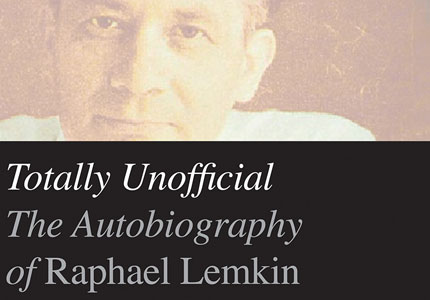Raphael Lemkin: The Unsung Hero Who Gave Genocide Its Name
Guilt without guilt is more destructive to us than justified guilt, because in the first case catharsis is impossible.
 He was the man who coined the term “genocide” and dedicated his entire life to making it illegal — but most people still don’t know his name. Raphael Lemkin, a Holocaust survivor, successfully campaigned in the 40s for the United Nations to approve the Genocide Convention, which establishes genocide as an international crime and emphasizes the punishment of the perpetrators. And yet for the better half of the past century, he has been largely ignored by the general public. Published here for the very first time, more than fifty years after his death, is Lemkin’s own account of his life.
He was the man who coined the term “genocide” and dedicated his entire life to making it illegal — but most people still don’t know his name. Raphael Lemkin, a Holocaust survivor, successfully campaigned in the 40s for the United Nations to approve the Genocide Convention, which establishes genocide as an international crime and emphasizes the punishment of the perpetrators. And yet for the better half of the past century, he has been largely ignored by the general public. Published here for the very first time, more than fifty years after his death, is Lemkin’s own account of his life.
Part history and part memoir, Totally Unofficial, edited by Donna-Lee Frieze, intertwines the momentous events of World War II with the intimate thoughts of a Polish Jewish refugee, who could only watch helplessly from America as his entire family was killed in the Holocaust, and who then threw himself into an all-consuming, self-punishing quest to fight the worst of all crimes against humanity.
Born in 1900, Lemkin was just six when he received news about a pogrom in the city of Bialystok, a few miles away from his family farm. There, anti-Semitic mobs had cut open the stomachs of their victims and stuffed them with feathers from pillows and comforters. He took an intellectual interest in the persecution of minority groups as soon as he learned to read, devouring books about the destruction of the Christians by Nero; of Carthage, the Huguenots, the Catholics in Japan. These readings left an indelible mark on his young conscience, as he renders sensitively in his introduction:
My conscience protested when I read that the Huguenots in Lyon were roasted alive by being compelled to sit with naked bodies on heated irons. The Moors were deported on boats. While on deck they were stripped of their clothes and exposed for hours to the sun, which finally killed them. Why should the sun, which brought life to our farm and reddened the cherries on our trees, be turned into a murderer?
Later in his youth, when he was a law student at the University of Heidelberg in Germany, he was similarly affected by the case of Shalom Schwarzbard, a Jewish tailor who had shot the Ukrainian minister of war, Symon Petliura. Petliura was responsible for the massacres that had taken the lives of Schwarzbard’s parents. Schwarzbard was eventually acquitted on the grounds of insanity, but Lemkin deplored the legal framework in which the decision had been made. The man had avenged hundreds of thousands of innocents with this assassination, but he had had to take the law into his own hands to do so. Why did the perpetrators of genocide have to be punished by vigilantes, and why could the court condemn only the latter?
When the Nazis invaded Poland, Lemkin was forced to flee to Sweden, and then to the United States, where he obtained a visa based on his appointment at Duke University. One morning in June 1941, he opened a well-worn envelope which had been traveling for more than two months. Written on a scrap of paper were a few simple words from his parents: “We are well and happy that the letter will find you in America.” Something within Lemkin told him that this was his parents’ final goodbye, and for days he could not chase away this heavy feeling:
Several days later, when the North Carolina night was paling, I woke, covered with deep sweat. I had had a dream in which my mother’s face came close to me. I didn’t see her body, just her face, with her hair combed low on her forehead. Her eyes smiled through a thick mist of sorrow, as if she knew a secret I did not. I stretched my hand toward her face, to caress it, but she moved back from my touch, fading gradually, and I awoke.
Several years later, he learned that his parents’ home had been burned to the ground, and that they had been sent to the gas chambers.
In a sensitive and penetrating review in The New Republic, Michael Ignatieff examines the obsessional quality of Lemkin’s devotion to his cause. Lemkin never married, had few friends, and left stable jobs to pursue his campaign to promote the Genocide Convention. In 1959, he died alone, with neither money nor friends. “He appears,” Ignatieff writes, “to have been on of Kafka’s hunger artists, those moving, self-punishing creatures who cut themselves off from the world, preyed upon by a guilt they cannot name, making their misery into their life’s work.” Towards the end of the book, Lemkin recounts an exchange with—who else—himself, as he considers the enormity of the project he has undertaken. In his mind, the sacrifice for the survival of future generations was always one that had to be made, and one that he took on in full knowledge that it would, ironically, lead to his own demise.
But this fight will finally destroy you, yourself. So what? Whoever fights for an ideal must risk his life.


























